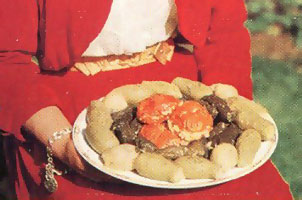Culinary traditions:
The practice of transforming and cooking foodstuffs for consumption is
peculiar to human beings.
Even though feeding is common to all living creatures, as it happens, the
act of cooking, or in other words altering and combining several foods, is a
distinctly human habit and a key factor in socialization.

The variety of culinary practices in Iraq is quite impressive. Environmental
and technical factors partly account for this. Thus, even in regions that
share a climatic zone and have the same varieties of vegetables and animals,
culinary traditions, not to say the choice of what is regarded as “edible”,
differ radically. This is because culinary practice is highly symbolic,
reflecting the whole scale of values of the society that it “feeds”. It is
affected just as much by the stops and starts that act on the social and
cultural order as by relations between the sexes and generations, social
ranking, ritual representation and the conceptions of health and disease.
The fact that cultural identity is also expressed in culinary terms argues
in favor of knowing, understanding and preserving cultural traditions. As a
mirror of human societies and of their historical and mutual interactions,
it is a cardinal part of the intangible heritage. That is reflected by the
variety of cosines, from “Kibet mosul” & ‘Urook” in Mosul, to the ‘Mazgouf”
in Baghdad, to the ‘ Biryani and Sabzi’ in Basrah, and ‘ FASENJOON” in Najaf.

For more information
about Iraqi cuisine
Delights from the Garden of Eden: A
Cookbook and a History of the Iraqi Cuisine

